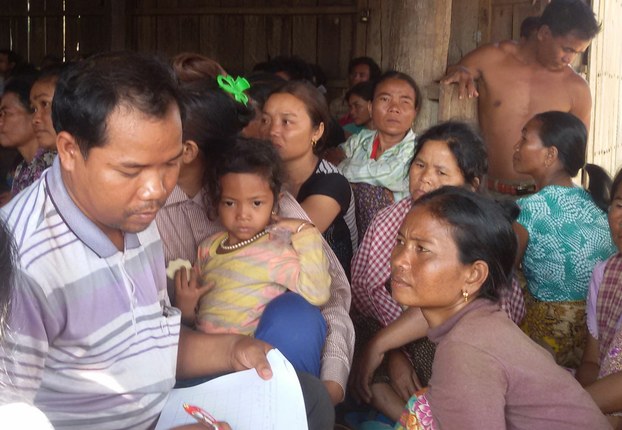




Hundreds of indigenous families in eastern Cambodia are facing difficulty securing food after losing their communally shared farmland to several companies as part of government-granted land concessions, villagers and a rights group said Tuesday.
Representatives of the more than 300 ethnic Stieng families from Memot district in Tbong Khmum province told RFA’s Khmer Service that five or six companies were granted the land to establish plantations for crops such as rubber trees, leaving villagers without a source of fish or crops.
A villager named Yem Kong said that before 2005, villagers used to cultivate around 4,000 hectares (9,880 acres) of shared land in a rotating fashion, but it had all been given away through concession licenses.
“We are facing difficulties [providing for ourselves] each day and we will have greater problems if we lose additional land,” he said.
Another Stieng villager named Yong Youn said that since losing the land, she has only one hectare (2.5 acres) of personal land to farm, which she said is not enough to support her family.
She said that she and her children were forced to work as local laborers in jobs that paid 15,000-20,000 riels (U.S. $3.70-4.95) per day to meet their basic needs, while other members of the family had left to find jobs elsewhere.
“We mothers and our children have to work,” she said.
“Some of our children have left us [to find jobs elsewhere].”
Sam Say, the deputy chief of Changkum Kandal village, in Memot’s Tonlung commune, said indigenous villagers in the area have been increasingly relying on farmland provide for their families, but that nothing was left for them after 2006.
“The villagers are living in a desperate situation,” he said.
Tonlung deputy commune chief Poeng Bunthorn confirmed that five to six companies were taking land from two area communes, with one company receiving at least 5,000 hectares (12,355 acres) of land in a concession, and said many of the villagers were now working for the companies.
But he denied claims that the villagers once collectively owned around 4,000 hectares of land and urged them to contact him if they did not have enough to feed their families.
“I appeal to the villagers—if they don’t have enough land for cultivation, please report to me so that I can request the government grant them a social land concession,” he said.
Cost of concessions
Neang Sovath, provincial coordinator for local rights group Adhoc, said land concessions were causing problem for villagers in the area.
“More people are getting poorer and losing jobs,” he said.
He blamed local authorities for inaccurate and opaque reporting to the government ahead of the granting of concession licenses, and said corruption was also contributing to land disputes.
“I believe those who reported to the government [for issuing land concession licenses] must be corrupt officials,” he said, urging authorities to reexamine concessions in Tbong Khmum province.
Land disputes are a bitter problem for Cambodia, where rural villagers and urban dwellers alike have been mired in conflicts that the U.N.’s special rapporteur for human rights in Cambodia has warned could threaten the country’s stability.
The country’s land issues date from the 1975-79 Khmer Rouge regime, which forced large-scale evacuations and relocations, followed by a period of mass confusion over land rights and the formation of squatter communities when the refugees returned in the 1990s after a decade of civil war.
Reported by RFA’s Khmer Service. Translated by Samean Yun. Written in English by Joshua Lipes.